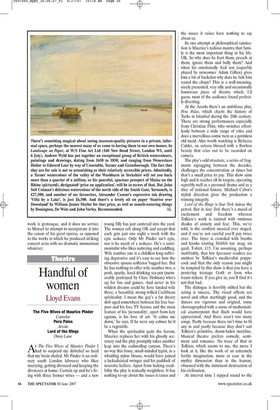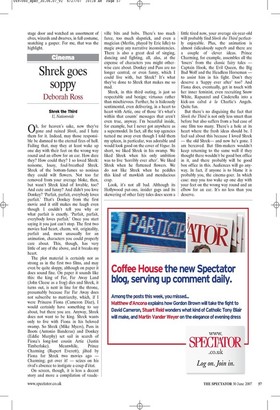Handful of women
Lloyd Evans The Five Wives of Maurice Pinder Cottesloe Pera Pales Arcola Lord of the Rings Dnuy Lane Ath. The Five Wives of Maurice Pinder I ad to suspend my disbelief so hard that my brain chafed. Mr Pinder is an ordinary south London labourer who likes marrying, getting divorced and keeping the divorcees at home. Curtain up and he's living with three former wives — and a new young filly has just cantered into the yard. The women rub along OK and accept that each gets just one night a week with the epic seducer. Only Mr Pinder isn't epic, nor is he much of a seducer. He's a sentimentalist who likes nattering and cuddling. Wife number one is a childless long-suffering depressive and it's easy to see how the obsessive spouse-collector bagged her. But he has nothing to offer wife number two, a posh, sparky, hard-drinking sex-pot (memorably portrayed by Clare Holman) who's up for fun and games. And never in his wildest dreams could he have landed wife three, a beautiful, strong-willed Caribbean spiritualist. I mean the guy's a fat dreary slob aged somewhere between his free buspass and his free TV licence and the main feature of his 'personality', apart from lazy egoism, is his love of art. 'It calms me down,' he says. If he were any calmer he'd be a vegetable.
When the spiritualist quits the harem, Maurice replaces her with his ghastly secretary and the play promptly takes another leap into the codswallop canyon. There's no way this bossy, small-minded typist, in a whistling nylon blouse, would have joined a lackadaisical swinger and his paddock of neurotic heifers. Apart from lacking credibility the play is textually weightless. It has nothing to say about the issues it raises and the issues it raises have nothing to say about us.
Its one attempt at philosophical rumination is Maurice's tedious mantra that family is the most important thing in his life. OK. So why does he hurt them, preach at them, ignore them and bully them? And when his emotionally frail son (superbly played by newcomer Adam Gillen) gives him a bit of backchat why does he belt him round the chops? This is a well-meaning, nicely presented, very silly and occasionally humorous piece of theatre which, I'd guess, most of the audience found perfectly diverting.
At the Arcola there's an ambitious play, Pera Palas, which charts the history of Turks in Istanbul during the 20th century. There are strong performances especially from Christian Flint, who switches effortlessly between a wide range of roles and does a marvellous comic turn as a gormless old maid. Also worth watching is Rebecca Calder, an actress blessed with a flawless beauty that cries out to be recorded on camera.
The play's odd structure, a series of fragments zigzagging between the decades, challenges the concentration at times but that's a small price to pay. This show aims high and it reaches all its targets, operating superbly well as a personal drama and as a slice of national history. Michael Cabot's stylish direction gives the production a winning integrity.
Lord of the Rings is Star Trek minus the petrol. But in Star Trek there's a mood of excitement and freedom whereas Tolkien's work is tainted with ominous shades of anxiety and fear. This, we're told, is the costliest musical ever staged, and if you're not careful you'll pay twice over. The foyer is crowded with booths and kiosks touting Hobbit tat: mug, six quid; T-shirt, £15. I'm assuming, perhaps snobbishly, that few Spectator readers are smitten by Tolkien's medievalist poppycock and that the only reason you might be tempted by this show is that you have a pestering teenage Goth or loon who wants tickets. If you give in, you'll find it's not that bad.
The dialogue is horribly stilted but the acting is sincere. The visual effects are novel and often startlingly good, and the dances are vigorous and original, some choreographed with a sense of mathematical counterpoint that Bach would have appreciated. And there aren't too many songs. Partly because there isn't time to fit any in and partly because they don't suit Tolkien's primitive, doom-laden storyline. Musical theatre prefers comedy, sentiment and romance. No trace of that in Tolkien, which seems to me, the more I look at it, like the work of an extremely fertile imagination, more at ease in the mythic dimension than in the human, obsessed with the imminent destruction of his civilisation.
At interval time I nipped round to the stage door and watched an assortment of elves, wizards and dwarves, in full costume, snatching a gasper. For me, that was the highlight.



















































































 Previous page
Previous page